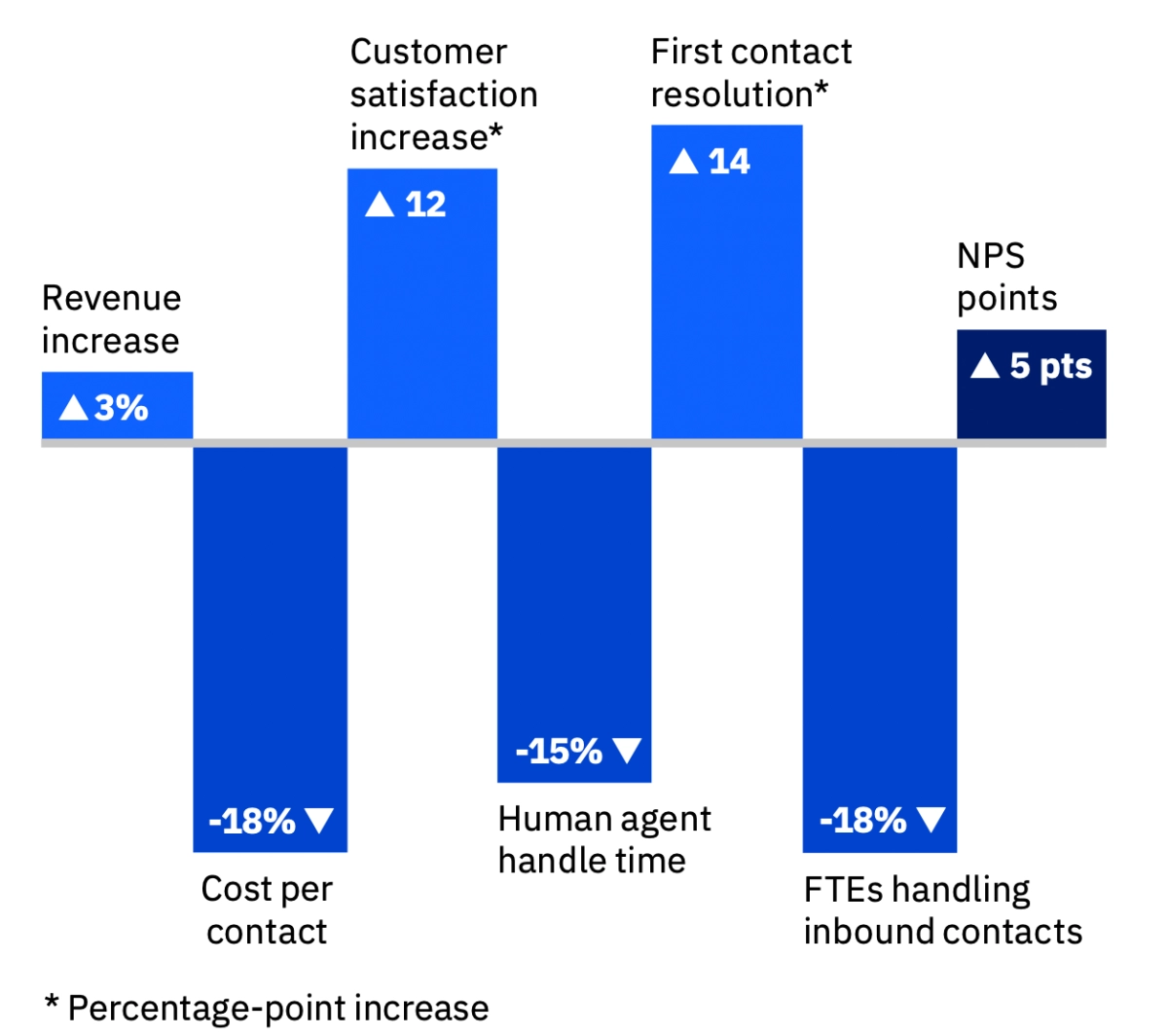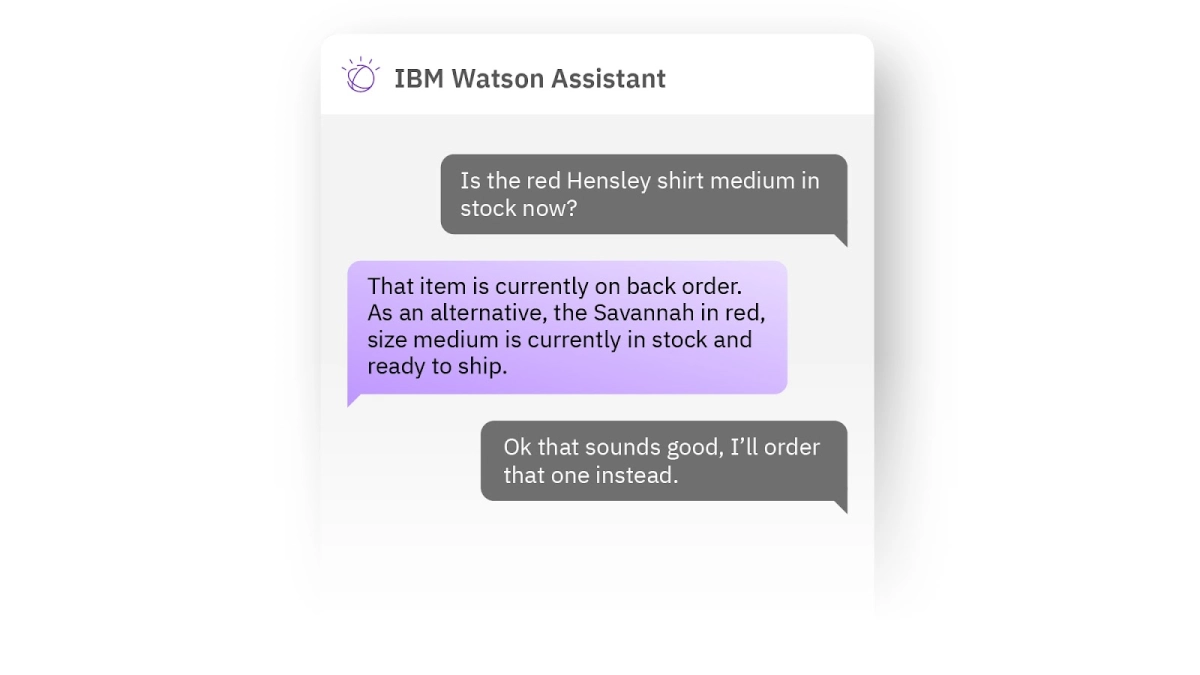Conversational AI in retail is a versatile solution, addressing the complications by enabling tailored interactions, enhancing customer satisfaction, and automating various aspects of online retail operations with revenue growth.
According to IBM, almost all businesses that use AI-based virtual agent technology (VAT) report a 12% boost in customer satisfaction (Figure 1).
Figure 1. Leaders’ average reported impact of using VAT

Source: IBM Institute for Business Value
Discover the top 9 conversational AI use cases transforming the retail industry.
1- Customer support
Conversational AI can be effectively used for customer support in the retail industry. By incorporating AI-powered chatbots and virtual assistants, retailers can streamline their customer service processes and provide instant, accurate information to retail customers.
AI-powered chatbots and virtual assistants are redefining customer service by handling common inquiries such as:
- Order-related queries: “Where is my order?” or “Can I return this item?”
- Product-related questions: “What size should I choose?” or “Is this product available in-store?”
These chatbots provide 24/7 instant support, reducing customer wait times while freeing up human agents to tackle complex cases. Advanced AI tools like natural language processing (NLP) ensure accurate, human-like responses, improving customer satisfaction and brand loyalty.
Using conversational AI in retail can assist customers in many ways, such as:
- Answering FAQs
- Customer authentication
- Multilingual support
- Troubleshooting
Real-life Examples
- IKEA: IKEA’s chatbot, Ask Anna, provides support by answering questions about store locations, opening hours, and product availability. It streamlines the customer journey by directing users to the relevant resources or human agents for complex queries.
- Zara: Zara’s chatbot assists with order-related queries such as tracking shipments and processing returns, providing quick and accurate responses that reduce customer frustration.
Sponsored:
Salesforce is the CRM market leader, and Salesforce Contact Genie enables multi-channel live chat supported by AI-driven assistants. Salesforce Contact Center enables workflow automation for many CRM branches, especially customer service operations, by leveraging conversational AI technologies.
2- Customer feedback analysis
Conversational AI can be used for customer feedback analysis in the retail sector. AI-driven tools can process and analyze large volumes of customer feedback from various sources, such as reviews, social media, surveys, and customer support interactions.
This analysis helps retail businesses understand customer needs, preferences, and pain points, which can be used to improve products, services, and overall customer experiences.
For those interested, here is our article on the benefits of sentiment analysis in the retail industry.
3- Dynamic customer segmentation
By analyzing customer data and interactions, AI-driven conversational tools can identify patterns and group customers based on their behaviors, preferences, and needs. This enables retailers to:
- Create targeted marketing campaigns
- Personalize customer experiences
- Optimize product offerings
Conversational AI can continuously update customer segments based on real-time data and interactions, ensuring that marketing strategies and product offerings remain relevant and effective.
4- Online in-store experience
Conversational AI can be used to enable an online store for customers, representing some of the in-store functions in online shopping. By incorporating AI-driven retail chatbots, virtual assistants, and other interactive technologies, retailers can recreate aspects of the in-store experience in a digital environment.
Sephora Virtual Artist
Sephora’s Virtual Artist chatbot integrates with platforms like Facebook Messenger and their mobile app, offering personalized beauty advice. Customers can try on makeup virtually, receive tailored product recommendations, and learn application techniques—all through an AI-driven conversational interface.
For example, Sephora uses conversational ai chatbots that enable customers to:
- Reserve products and pick them up in-store
- Search product availability
- Ask questions on store timings and returns
- Identify products from celebrity photos
- Book an appointment in the store
Figure 2. Sephora Virtual Assistant

Source: Cosmetics Business
5- Order tracking
By integrating AI-powered chatbots and virtual assistants with existing order management systems, retailers can give customers real-time updates on their order status, delivery times, and other relevant information. This helps improve customer experience and builds trust in the retailer’s services.
Figure 3. A conversational order tracking

Source: Yellow.ai
Real-life examples
- Domino’s Pizza: Domino’s chatbot, Dom, is a good example of conversational AI in retail. It allows customers to track their pizza orders in real time, from preparation to delivery, offering a seamless and transparent experience.
- ASOS: ASOS’s AI-driven chatbot helps customers check the delivery status of their orders and provides updates on estimated arrival times, minimizing customer anxiety about shipments.
6- Personalized shopping assistance
Conversational AI in retail can personalize customers’ shopping experiences. AI-powered chatbots and virtual assistants can help customers based on their preferences, purchase history, and other available data.
This personalized approach can improve the shopping experience, boost customer satisfaction, and increase sales.
Some ways conversational AI can be used for personalized shopping assistance in retail include:
- Product recommendations
- Outfit suggestions
- Complementary product suggestions
- Size and fit assistance
- Gift recommendations
For example, the retail giant eBay leveraged its own AI powered shopping bot for enabling personalized experience for its customers.
7- Personalized promotions
Conversational AI in retail can be used for personalizing promotions and discounts tailored to each customer.
By analyzing customer data, such as purchase history, preferences, and browsing behavior, conversational AI tools can provide targeted offers and incentives tailored to each customer’s needs and interests. This personalization can lead to increased customer engagement, higher conversion rates, and enhanced customer loyalty.
8- Product details
Conversational AI in retail can be used to provide timely product details to customers. AI-powered chatbots and virtual assistants can access product information from retail stores, databases or product catalogs and present it to customers in a conversational manner.
Figure 4. Illustration showing IBM Watson Assistant interaction with the person asking for a specific color and size shirt

Source: IBM Watson Assistant
9- Payments and refunds
Conversational AI can assist and facilitate payments and refunds in the retail industry. However, it is essential to ensure the proper security measures and integrations with payment processing systems are in place. It can provide customers with a convenient way to manage transactions while maintaining a conversational and user-friendly experience.
Some ways conversational AI in retial can be used for payments and refunds in retail include:
- Payment processing
- Voice-activated payments
- Invoice generation
- Fraud detection
10- Inventory Management
Conversational AI aids both customers and retailers by:
- Enabling customers to ask, “Is this item available in my size at my local store?” or “Notify me when this product is back in stock.”
- Helping retailers optimize stock levels by analyzing purchase trends and predicting demand patterns.
This use case minimizes stockouts and overstocking, ensuring a balanced inventory.
FAQ
What is Conversational AI in Retail?
Conversational AI in retail refers to using artificial intelligence technologies, such as chatbots, virtual assistants, and voice recognition systems, to enable natural, human-like interactions between customers and retailers. These AI-powered tools are designed to mimic human conversations, using technologies like natural language processing (NLP), machine learning (ML), and speech recognition to understand customer queries, provide responses, and perform actions.
It serves as a bridge between the retailer and the customer, offering personalized, real-time assistance across multiple touchpoints, including websites, mobile apps, social media platforms, and in-store kiosks.
What are the core capabilities of conversational AI in retail?
Natural Language Understanding (NLU): Ability to interpret customer intent accurately.
Context Awareness: Understanding the context of previous interactions to provide coherent responses.
Multi-channel Support: Integration across platforms like websites, apps, and messaging services (e.g., WhatsApp, Facebook Messenger).
Personalization: Leveraging customer data to offer tailored experiences.
Automation: Performing repetitive tasks such as order tracking, FAQs, or product recommendations.
What are the main benefits of using Conversational AI in retail?
Conversational AI in retail provides 24/7 customer support, personalized product recommendations, and real-time order tracking. It improves customer engagement, streamlines shopping journeys, and reduces operational costs by automating repetitive tasks. Retailers can also gain valuable insights into customer behavior to refine their strategies.


Comments
Your email address will not be published. All fields are required.